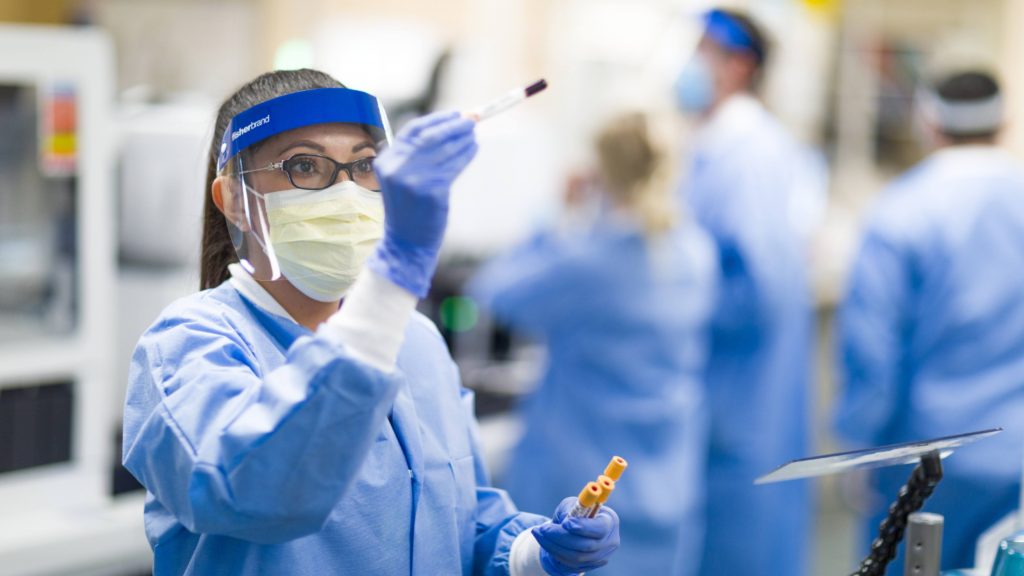-
Individualized Medicine
Mayo Clinic launches neutralizing antibody test to advance COVID-19 therapies

ROCHESTER, Minn. — Mayo Clinic has launched a new SARS-CoV-2 neutralizing antibody test in support of the national Expanded Access Program for Convalescent Plasma and other critical research efforts to establish effective therapies and vaccines for COVID-19. The test will be available through Mayo Clinic Laboratories to select labs, blood banks, and biopharma clients in late June.
The new test measures the level of neutralizing antibodies against SARS-CoV-2, the virus that causes COVID-19. Neutralizing antibodies are a subset of antibodies able to independently inactivate viruses, and are associated with protective immunity against re-infection for many infectious pathogens.
“The neutralizing antibody test is a critical addition to our COVID-19 testing, expanding on the capabilities of the molecular tests used to diagnose active infection and the serology test, which indicates previous infection by identifying antibodies for the SARS-CoV-2 virus,” says William Morice, II, M.D., Ph.D., president of Mayo Clinic Laboratories. “This new test provides us with incredibly important information about how effective a person’s antibodies are at neutralizing the virus. This will help us identify optimal convalescent plasma donors and ultimately help assess the efficacy of anti-SARS-CoV-2 vaccines.”
The neutralizing antibody test provides semi-quantitative detection of total neutralizing antibodies against the SARS-CoV-2 spike glycoprotein in human serum. The surface of the SARS-CoV-2 virus is coated with the spike glycoprotein, which binds to receptor proteins on the surface of healthy cells, leading to viral entry and infection throughout the body. Following infection, most individuals will develop an immune response to the virus, including the production of neutralizing antibodies against the SARS-CoV-2 spike glycoprotein. These antibodies can prevent future infection by blocking the binding activity of the spike glycoprotein. At this time, it is unknown for how long neutralizing antibodies persist following infection and what level of neutralizing antibodies are necessary to confer protective immunity.
The SARS-CoV-2 neutralizing antibody test should not be used to diagnose SARS-CoV-2 infection. The test should only be ordered upon confirmation of prior infection by molecular and/or serological studies using clinically validated assays with high clinical specificity.
“It is important to note that the neutralizing antibody test is not a replacement for the existing serology testing for COVID-19, which detects antibodies that recognize the virus and serves as an indicator of current or prior infection,” says John Mills, Ph.D., co-director of the Mayo Clinic Neuroimmunology Laboratory. “However, the existing serology tests do not directly assess the virus-neutralizing capacity of those antibodies. The neutralizing antibody test adds that next level of detail for researchers and clinicians by providing an accurate estimate of SARS-CoV-2 neutralizing activity.”
This new test was developed and clinically-validated at Mayo Clinic with support of Vyriad, Inc., Regeneron, and Imanis Life Sciences. This was made possible through a significant COVID-19 innovation initiative of the Mayo Clinic Department of Laboratory Medicine and Pathology and the Mayo Clinic Center for Individualized Medicine.
“The co-development of this neutralizing antibody assay in record time (two months!) is really a testament to the dedication and teamwork of countless individuals at Mayo Clinic, Vyriad, Regeneron, and Imanis Life Sciences,” says Elitza Theel, Ph.D., director of Mayo Clinic’s Infectious Diseases Serology Laboratory. “These teams have been devoted to advancing the science and expanding our available laboratory testing capabilities, which will ultimately lead to a better understanding of our immune response to this virus.”
The test was made possible by a multi-organization collaboration, each bringing unique expertise and technology to the effort. The basis of the new test is the IMMUNO-COV™ neutralizing antibody test developed by Vyriad. A license was granted from Regeneron.
“The development of this scalable neutralizing antibody assay was the result of an extraordinary and highly integrated collaborative effort between scientific teams at four companies: Imanis Life Sciences, Vyriad, Mayo Clinic, and Regeneron,” said Stephen Russell, M.D., Ph.D., chief executive officer of Vyriad. “We believe that the launching of the test at Mayo Clinic Laboratories fills a critical gap in the serology testing landscape and represents a significant milestone in the fight against COVID-19.”
Media contact: Suzanne Ferguson, Mayo Clinic Public Affairs, 507-284-5005, newsbureau@mayo.edu
Recovered from COVID-19? Please consider donating your blood. The national resource sharing network will help you find a blood donation location near you. Mayo Clinic, the American Red Cross and the larger blood-banking community are working with physicians to collect and distribute donor plasma to hospitalized patients with severe or life-threatening COVID-19.
###
About Mayo Clinic
Mayo Clinic is a nonprofit organization committed to innovation in clinical practice, education and research, and providing compassion, expertise and answers to everyone who needs healing. Visit the Mayo Clinic News Network for additional Mayo Clinic news and
Mayo researchers define type of Alzheimer’s that affects people in their younger years – Mayo Clinic News Network Mayo Clinic Facts for more information about Mayo.
About the Department of Laboratory Medicine and Pathology and Mayo Clinic Laboratories
The Mayo Clinic Department of Laboratory Medicine and Pathology and its reference laboratory Mayo Clinic Laboratories provide advanced laboratory testing and pathology services to support 4,000 health care organizations around the world. Revenue from this testing supports medical education and research at Mayo Clinic, a nonprofit worldwide leader in medical care, research and education for people from all walks of life. Complemented by collaborations with diagnostic and biotechnology companies, the department maintains a robust diagnostic test development program, launching more than 150 new tests each year.
Information in this post was accurate at the time of its posting. Due to the fluid nature of the COVID-19 pandemic, scientific understanding along with guidelines and recommendations may have changed since the original publication date.
Check the Centers for Disease Control and Prevention website for additional updates on COVID-19. For more information and all your COVID-19 coverage, go to the Mayo Clinic News Network and mayoclinic.org.







